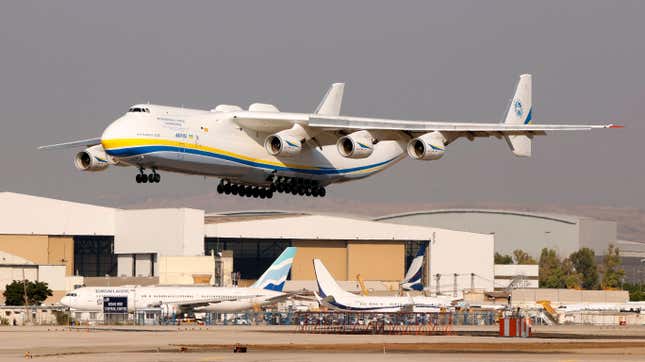
Ukraine president Volodymyr Zelensky has announced that a symbol of his nation’s pride will take to the skies again. The country plans on reviving the legendary Antonov An-225 Mriya by finishing the second airframe that has been sitting around since the before the fall of the Soviet Union.
When Russia invaded Ukraine back in February 24, a critical battleground was Hostomel Airport, also known as Antonov International Airport. The airport, just outside of Kyiv, can help deliver troops to the city in mere minutes. One of the casualties of the battle for the airport is the one and only Antonov An-225, an aircraft famous for being the world’s largest cargo plane and carrying some of the largest loads that the planet has ever seen.
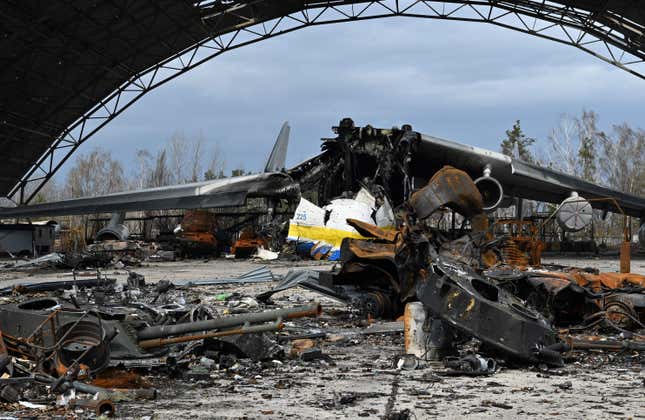
Ever since the aircraft was destroyed, the country has been finding out how it could bring the aircraft back to life. Zelensky, along with the aircraft’s caretakers, believe that seeing the Mriya (Ukrainian for dream) fly again would not only be a giant middle finger to Russia, but honor the pilots killed in the war and in the defense of Mariupol.
During an online call with Ukrainian students, Zelensky noted that the An-225 has a second airframe that has been sitting unfinished for years: “We wanted to build it, we needed $800 million. I appealed to the President of Turkey with a proposal to build the 2nd MRIYA, but we did not find the money.”
Today, he notes, the issue isn’t of money, but the ambition to see it through. But why has a second airframe been sitting around unfinished for over 30 years in the first place?
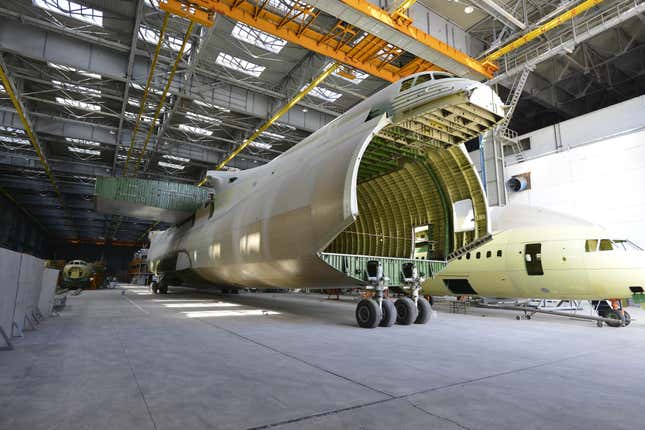
The Antonov An-225 Mriya didn’t start its life as an international cargo transporter. Instead, its original purpose was very different: carry rocket boosters and space shuttles for the Soviet space program.
In the 1980s the Soviet Union was developing its own version of America’s Space Shuttle Program. However, the Soviets experienced a major problem. The sizable components of the advanced Buran orbiter and its Energia rockets could not be transported by ground transport. Instead, these components were produced in the west and had to be flown to the Baikonur Cosmodrome in the east to be launched.
In the early days of the Soviets trying to get their orbiter off of the ground, components were bolted onto the back of old bombers. But this solution wasn’t great, as the components had to shed parts to become light enough for the bombers to safely carry.
As it turned out, the west already had this figured out. The Americans took a used Boeing 747, stripped it of the parts from its previous commercial life, then reinforced it for the task of carrying the Space Shuttle orbiter.
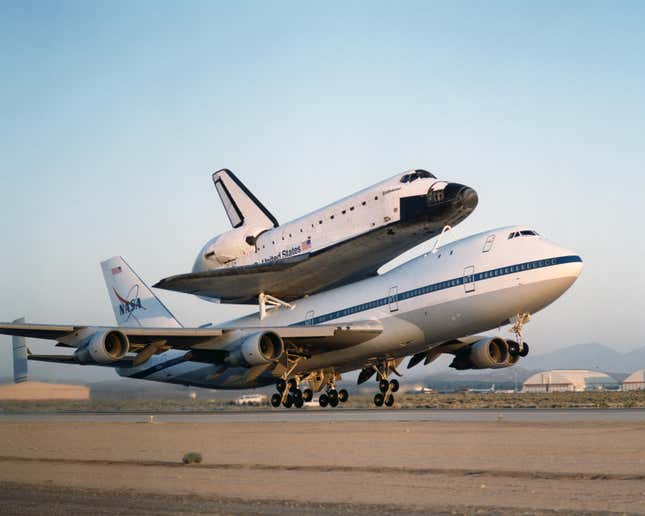
At first, the Soviets followed suit, strapping parts to Antonov An-124. But even though the Antonov An-124 was the largest cargo transporter in the world it still wasn’t large enough for the Soviet space program. Left without any other option, engineers took to expanding the An-124 into something that could get the job done.
The airframe of the An-124 Ruslan was lengthened, its wings made larger and its vertical stabilizer split into into a distinctive twin stabilizer. The An-225's remarkable spec sheet didn’t stop there. The plane had 32 tires to safely roll itself and its payload down a runway. And that payload? Antonov baked in some incredible numbers. The An-225 could hold a 551,155-pound payload in its hold or something over 440,000 lb on top of its fuselage.
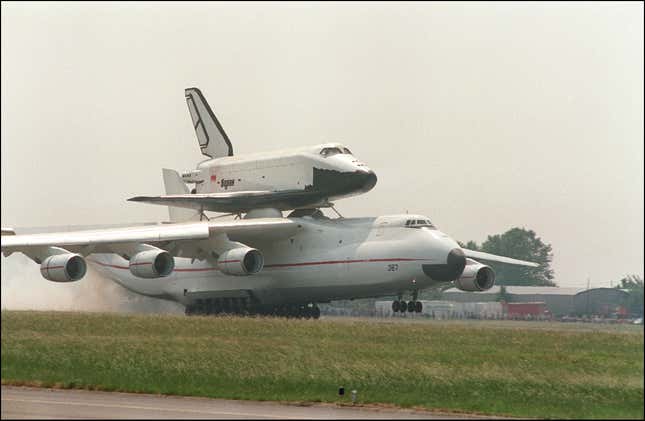
All of that weight is moved by six Ivchenko Progress/Lotarev D-18T turbofans engines making 309,000 pounds of total thrust. For comparison, a Boeing 747-8 makes 266,000 pounds of thrust from its four engines and has a 308,000 pound payload. In late 1988, the Dream lifted into the sky and into the record books.
The Soviets originally planned for a whole fleet of An-225s to be used to carry spacecraft and rockets, and as a mobile launch platform. Antonov even got to work on a second airframe before the close of the 1980s. The second An-225 would improve on the first.
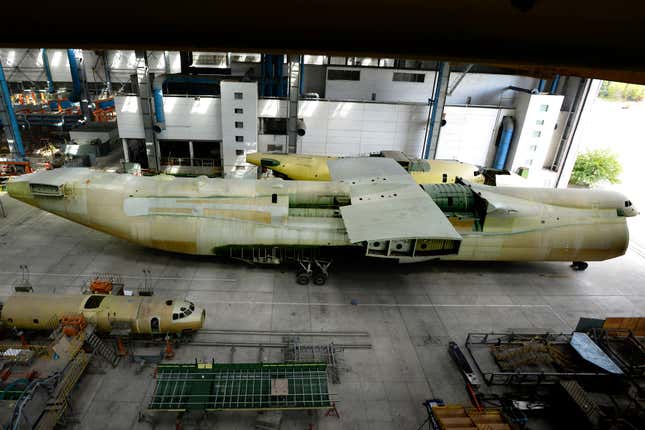
Where the first had just a single cargo door up front, the second would have another cargo door placed in the back. This would have allowed the Antonov to be unloaded as it was loaded. The second An-225 would also lose the characteristic split stabilizer for a more traditional single vertical stabilizer.
Unfortunately, trying to build these planes in the late 1980s meant that the Soviet Union was already going broke and collapse was right around the corner. The second aircraft never reached completion and Antonov has had problems finding funding to finishing it ever since.
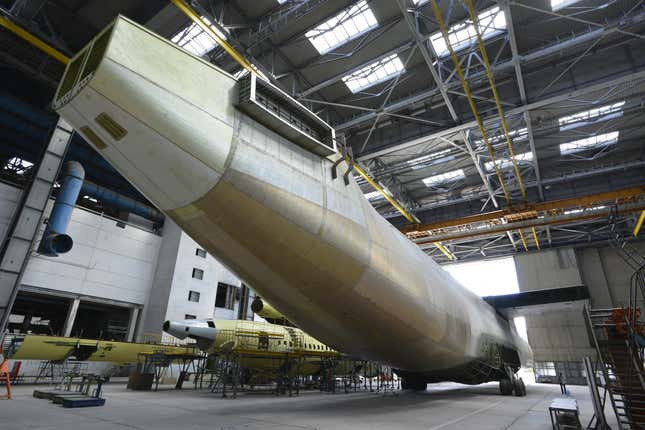
While the sole completed An-225 has found a niche in the cargo transport market by finding loads that no other plane could carry, Antonov has struggled to find investors that believe that the world needs two of these. As noted before, Turkey was approached with the idea. Back in 2017, the Airspace Industry Corporation of China also saw the second airframe as a potential launch platform for China’s space program.
There were many proposals and even some construction work done on the plane, but none of them have worked out, leaving the plane in a 70 percent completed state.
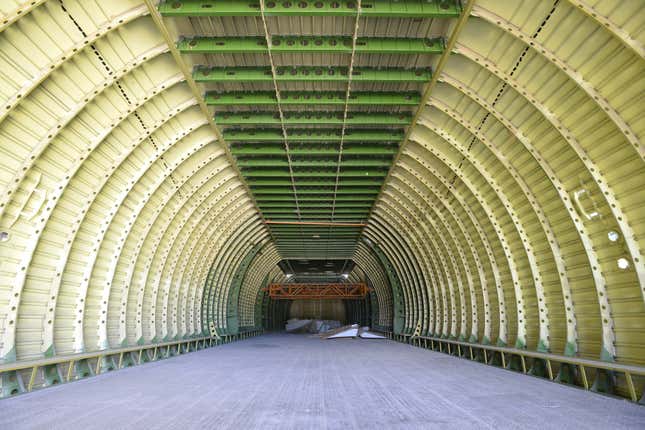
A lot of it comes down to the cost-conscious commercial aviation of today. The An-225 cost $30,000 an hour to operate, so it’s largely reserved for customers who absolutely need their locomotive delivered across the world in a short amount of time.
But now, with the one and only completed airframe burned out into a charred mess, finally finishing that second airframe is back on the table.
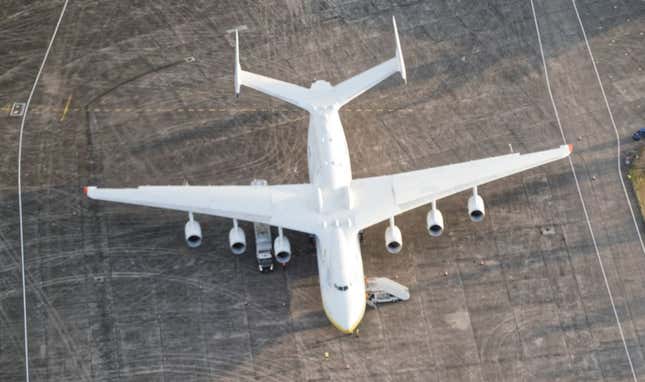
And President Zelensky wants this second plane to honor those who have fallen in this war: “We were approached by Ukroboronprom, the Antonov team. This is a question of the image of our country and all the excellent professional pilots who died in this war ... How much they have done, and today we can already say how many lives of people who remained in Mariupol, especially in Azovstal they saved ... How many pilots gave their lives to bring everything there, from weapons to water. And how many wounded they took from there. A large number of these people died heroically. To build a MRIYA for the sake of the memory of heroes is the right state position.”
It’s unclear how long it will take to see a Mriya flying again. Ukrainian defense industry conglomerate and owner of Antonov, Ukroboronprom, said that rebuilding Mriya would take $3 billion and five years. How long it would take to finish the second airframe wasn’t mentioned. Either way, Ukraine expects the money to come from war reparations. Antonov tried to crowdfund the revival, but it has managed to raise just $4,200 as of early May.